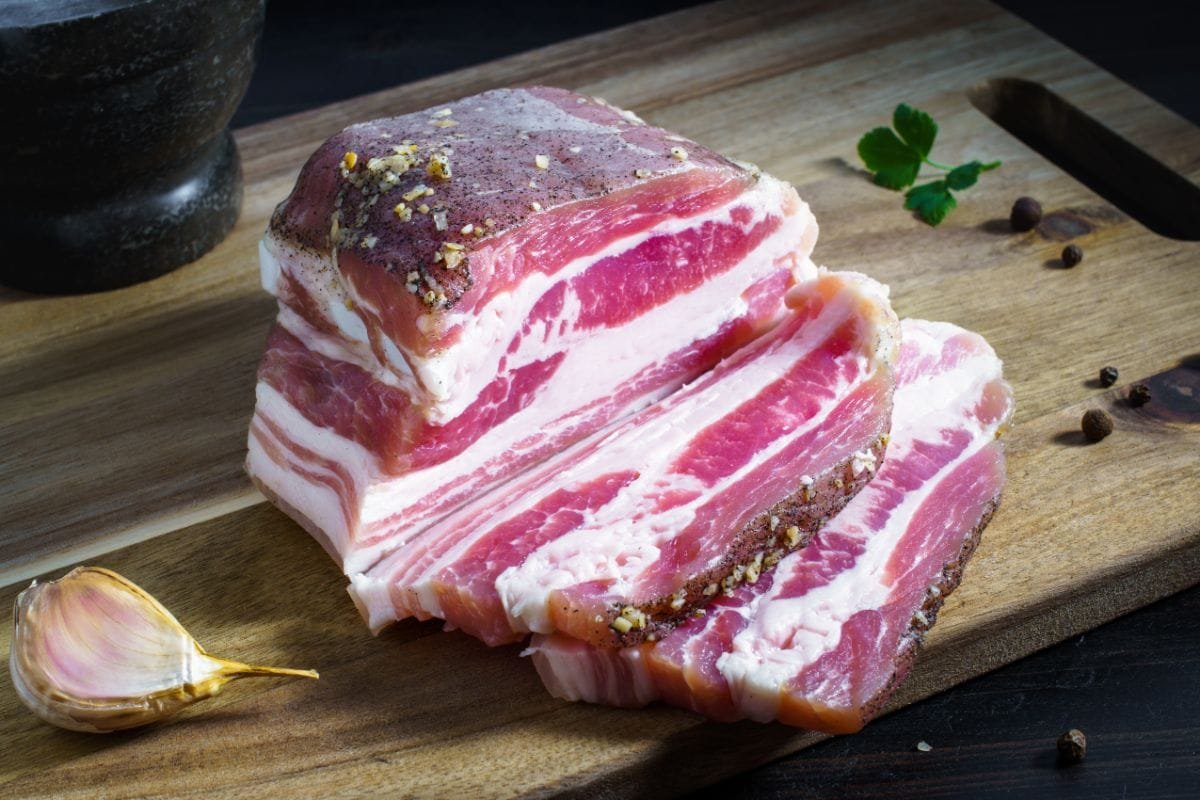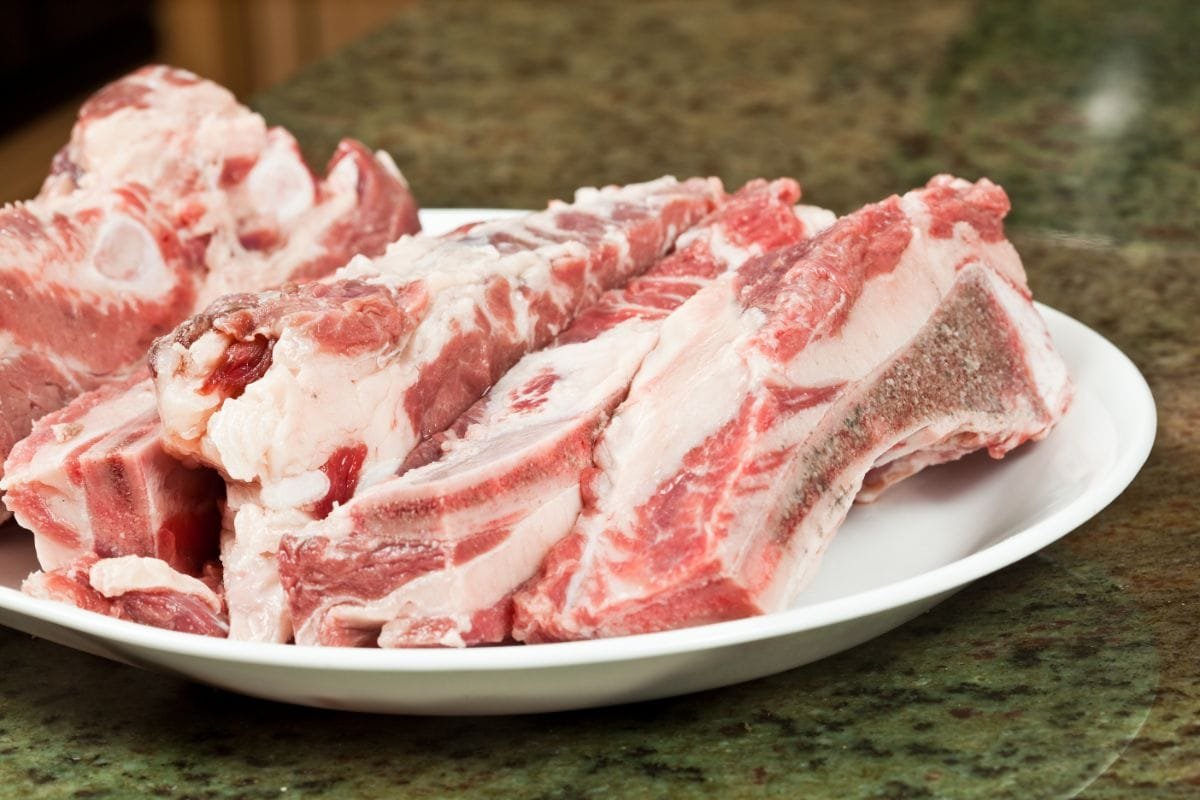Brining is a method of cooking meat that involves submerging it in a saltwater solution for hours or days before cooking.
Brined meats tend to be juicier and more flavorful than those cooked without brine, and so is a popular option.

There is one debate, however, that seems tricky to settle: should brisket be cooked with brine, or is that a huge no-no for the dish?
We took a look at both sides to ensure that you have all the information you need to make a smart, delicious choice.
What Is Brisket?
Brisket is a cut from the beef shoulder blade, and the muscle fibers are long and thin.
This offers a popular, tender taste, but also means that this meat is prone to drying out when not properly handled.
These qualities make brisket an ideal candidate for braising and other slow-cooking techniques.
What Is Brine?
A brine is a mixture of water and salt. When combined with the right amount of sugar, the brine will help draw moisture from the meat during the brining process, keeping it juicy and tender.
Brines can vary widely in terms of their ingredients, but most contain some combination of table salt, sugar, and spices. Some recipes call for adding citrus juice, garlic, herbs, or even wine.
Why Do You Need To Brine Meat?
The benefits of brining go beyond just enhancing flavor. Brining helps keep the meat moist by drawing moisture away from the surface of the meat.
This allows the meat to cook evenly throughout, resulting in less shrinkage and a higher quality final product.
In addition, brining makes the meat easier to slice and serve because it reduces the risk of tearing.
The key to getting the best results from your brine is to use enough salt to season the meat thoroughly. If you don’t add enough salt, the meat won’t absorb as many juices as you’d like.
Too little salt, on the other hand, will result in a dry, salty taste.
While there is no official rule about how much salt you should use, most recipes recommend
using 1/2 teaspoon per pound (0.1 ounces) of meat. This ensures that the meat gets plenty of seasoning while avoiding any bitter flavors.
Is Brining Necessary?
While brining adds flavor to meat, it isn’t always necessary. Many people prefer to skip the extra step of soaking their briskets in a brine, choosing instead to simply rub them with salt and pepper.
Although this approach does work well, it doesn’t give the same deep flavor that comes from brining.
What Kind Of Salt Should I Use?
When brining meats, you want to make sure that the salt penetrates deeply into the meat without causing bitterness or burning.
For this reason, most recipes call for kosher salt, which dissolves easily and provides a clean, non-bitter flavor. You can substitute table salt if you wish, but it won’t have quite the same effect.
How Long Does Brining Take?
There are two main methods of brining: cold-brining and hot-brining. Cold-brining requires the meat to be submerged in a brine for several hours or overnight.
Hot-brining takes place over a shorter period of time, usually between 30 minutes and 24 hours.
Brining meat will change its texture somewhat depending on how much time it spends in the brine. For example, if the meat is only brined for 30 minutes, it will still retain some chewiness.
However, after 24 hours of brining, the meat will be almost completely soft.
Should I Brine Brisket?
Brining is one of the easiest ways to ensure that your brisket cooks evenly and stays moist. Brining works especially well with brisket because it has a high-fat content.
Fat keeps the meat from drying out, so it’s important to get rid of excess moisture before cooking. Brining also helps to break down connective tissue, making the meat more tender.
Some main advantages to brining brisket include:
Adds A Deeper Flavor To Meat
Brining gives the meat a deeper flavor than rubbing it with salt and pepper alone.
Reduces Dryness of Meat
Brining draws moisture from the surface of the brisket, which prevents it from drying out when cooked.
Keeps The Meat Moist And Juicy
Since the meat absorbs liquid during the brining process and then releases it again when cooked, it remains juicier than meat not brined.
Prevents Shrinkage During Cooking
When the meat is exposed to air, it dries out and shrinks. By submerging the meat in a brine, it can stay moist and prevent shrinkage.
It Keeps The Meat From Tearing When Served
If you’re serving the brisket whole, it may tear when sliced. But once it’s been brined, the meat is softer and more pliable, and this makes it easier to slice and cut.

How Long Should I Brine My Brisket For?
There are two different approaches to bringing. Some people soak their brisket overnight, while others leave it in the brine for only an hour or two.
Whichever method you choose, be sure to let the meat sit in the brine long enough to penetrate all surfaces.
Soaking Your Brisket Overnight
To soak your brisket overnight, place it in a large container, such as a plastic bag, along with the brine ingredients. Cover the container tightly and refrigerate it for at least 8 hours or up to 24 hours.
To remove the brisket from the brine, rinse it under cold water and pat dry. Place it on a rack set over a baking sheet and allow it to rest for 30 minutes. Then cover it loosely with foil and return it to the refrigerator until needed.
Saving Time With An Hour Or Two Of Brining
You don’t need to spend the entire day bringing your brisket. If you plan to serve it within 2 days, you can use a shorter brine time. Just follow these steps:
Place the brisket in a large container, like a plastic bag, and add the brine ingredients. Make sure to distribute the spices throughout the container. Cover the container tightly, and refrigerate it for 1 hour or 2 hours.
Next, remove the brisket from the container and rinse it under cold running water; pat it dry with paper towels. Let it stand uncovered for 30 minutes.
Wrap the brisket loosely in aluminum foil and return it to its original storage location. Serve the brisket within 2 days.
Does Resting Brisket Affect the Need for Brining?
Rest your brisket properly to ensure it stays tender and juicy. Brining can help add flavor and moisture, but if you rest the brisket correctly after cooking, you may not need to brine it beforehand. Proper resting allows the juices to redistribute, resulting in a more flavorful and succulent brisket.
Are There Any Downsides To Brining?
While there are many benefits to brining, there are some downsides too, and some of the most common include:
The Brine Can Overcook The Meat
If the brine contains sugar (as many do), it will cause the meat to cook faster than normal. This means that if you want to keep the meat moist, you’ll have to monitor it closely, so it doesn’t overcook.
The Brine Will Leave Behind Saltiness
Some people prefer to avoid adding extra salt to their food because they feel that it causes them to retain fluid after eating. However, this isn’t necessarily true.
In fact, some people find that brines actually make the food taste better by enhancing flavors. So if you’d rather not add extra salt to your meal, try using brine without any added salt.
Brines Can Contain A Lot Of Water
Some people worry about the amount of moisture left behind after brining. While it’s true that a lot of water is used during the process, the same thing happens when cooking a roast in the oven.
And since we know that roasting helps tenderize the meat, the same effect should occur here.
Top Tips For Cooking Brisket
To make sure that your brisket tastes its best, here are some top tips for preparing and cooking:
1. Decide How Much Brisket You Will Need
Before you begin making your brisket, decide how much you will need. Remember that the cut size will vary depending on whether you’re going to slice your brisket into thin slices or chop it into cubes.
Also, remember that the weight of the brisket will affect the cooking time.
2. Choose A Good Cut Size
When selecting a cut size, consider the thickness of the brisket. Thin cuts require less cooking time, while thicker cuts take longer.
3. Cook Your Brisket On Medium Heat
After placing the brisket in the pot, bring the liquid to a boil. Once boiling, reduce the heat to medium-low and simmer the brisket for 4 hours.
4. Add More Liquid During The Last Half Hour
After removing the brisket from the pot, let it rest for 20 minutes before slicing it.
Then place the sliced brisket back in the pot, cover it with more liquid, and continue cooking it until the internal temperature reaches 165 degrees F.
5. Don’t Skimp On The Seasoning
Season your brisket generously with kosher salt and freshly ground black pepper.
Final Thoughts
Prepared properly, brisket can be a delicious dish – and brining can be a great way to enhance flavor and make the most of your meal.
With our top tips on hand, you can guarantee mouthwatering results each and every time, and ensure that your dinner parties are remembered for all the right reasons!
